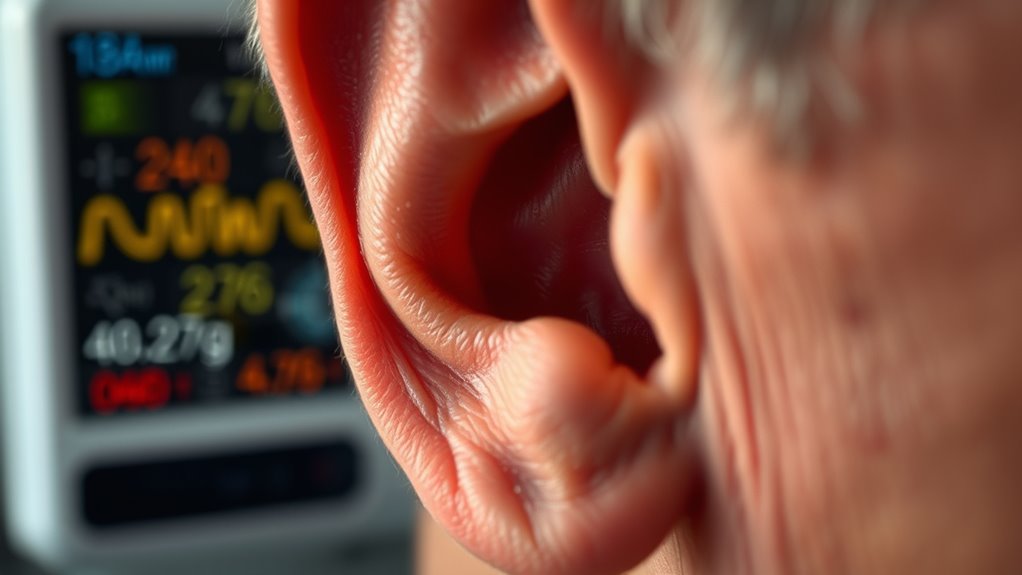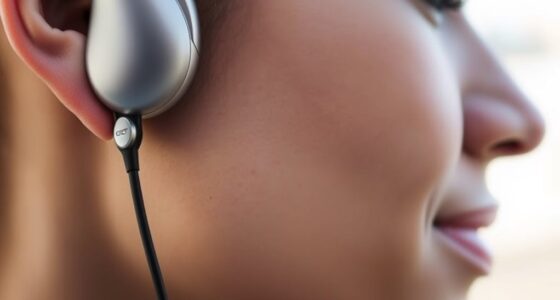Diabetes affects your hearing by damaging the tiny blood vessels and nerves in your ears. High blood sugar causes inflammation, swelling, and reduces blood flow, which can lead to nerve damage and difficulty processing sounds. Over time, this may cause muffled hearing, tinnitus, or trouble understanding speech, especially in noisy places. Managing your blood sugar levels can help protect your ear health, so stay informed to learn more about keeping your hearing safe.
Key Takeaways
- High blood sugar causes inflammation and swelling in ear structures, leading to muffled hearing and ringing sensations.
- Diabetes damages small blood vessels in the ear, reducing oxygen and nutrients essential for hearing health.
- Nerve damage from diabetes impairs sound transmission, making it difficult to process and understand speech.
- Early signs include muffled sounds, ringing, and difficulty hearing in noisy environments.
- Managing blood sugar levels and maintaining overall health can help protect hearing function.
The Connection Between Blood Sugar Levels and Ear Health
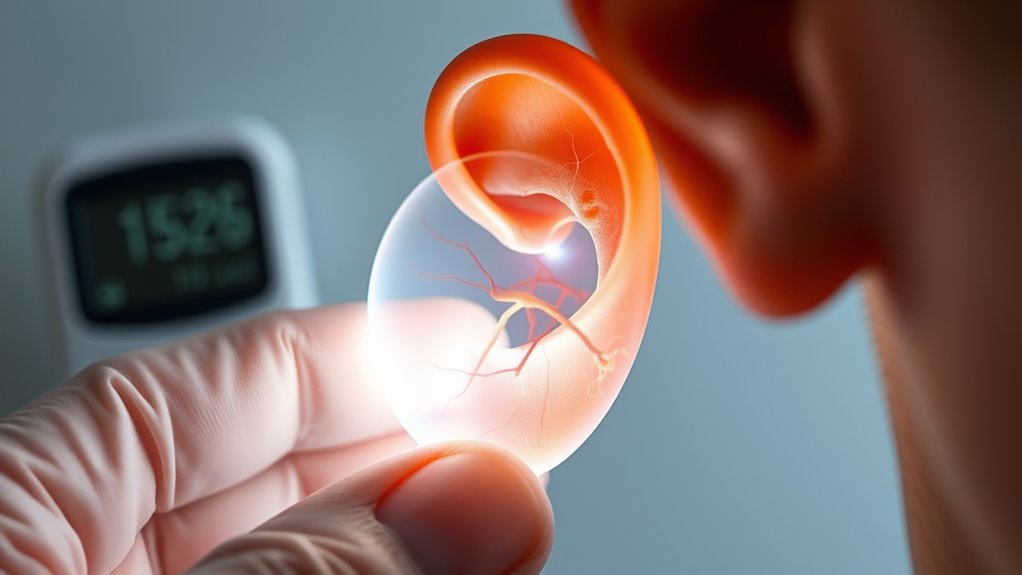
High blood sugar levels, common in people with diabetes, can directly impact your ear health. When your blood sugar is high, it affects the fluids and nerves in your ear, making it harder for your auditory system to function properly. Elevated glucose levels can cause inflammation and swelling in the ear’s delicate structures, leading to muffled hearing or ringing. Over time, persistent high blood sugar can damage the nerves involved in hearing, resulting in gradual loss. You might notice changes in your hearing abilities or increased sensitivity to noise. Managing your blood sugar is essential to protect your ear health, as fluctuations can worsen these effects. Maintaining stable blood sugar levels helps reduce the risk of hearing problems related to diabetes.
How Diabetes Affects Blood Vessels in the Ear
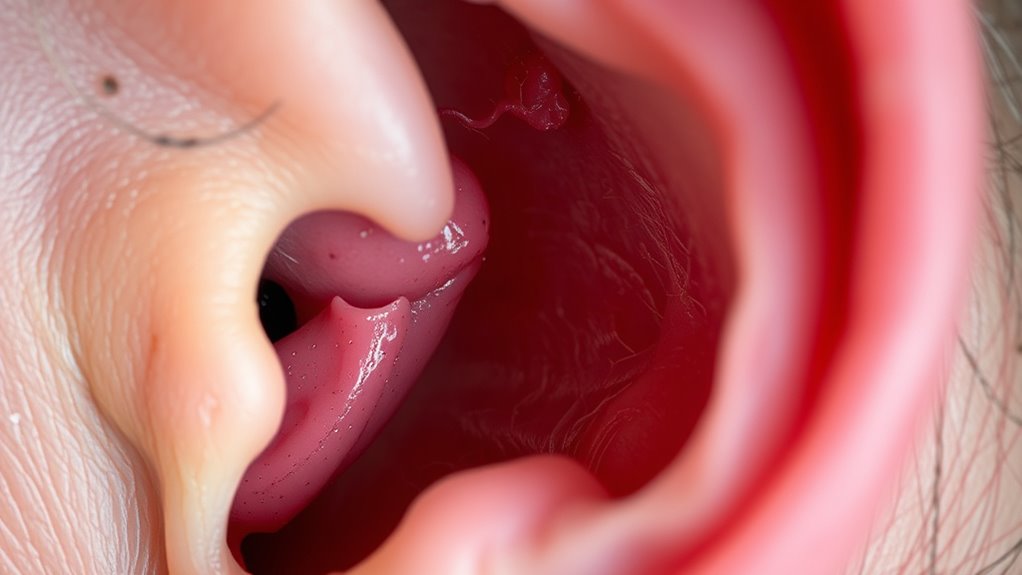
Diabetes can considerably impair the blood vessels in your ear, leading to reduced blood flow and oxygen delivery to the delicate tissues. When blood vessels become damaged or narrowed, your ear’s inner structures don’t get enough nutrients and oxygen, which can harm hearing functions over time. The damage mainly affects small vessels that supply blood to the cochlea and other ear components. As these vessels weaken, your hearing may decline gradually. Recognizing this, it’s essential to manage blood sugar levels to protect your blood vessels. Here’s a visual to understand the impact:
| Healthy Blood Vessels | Damaged Blood Vessels |
|---|---|
| Efficient oxygen delivery | Restricted blood flow |
| Strong, flexible walls | Narrowed, stiff walls |
| Proper nutrient supply | Reduced nutrients |
Additionally, adopting a consistent creative practice can help in developing resilience and problem-solving skills that are beneficial in managing chronic conditions like diabetes.
Nerve Damage and Its Role in Hearing Loss
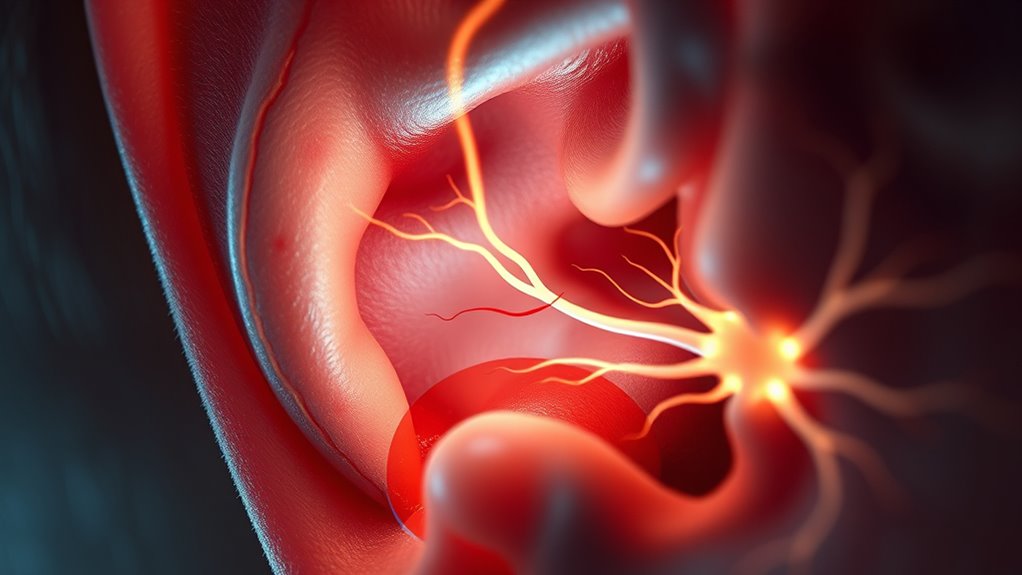
When blood vessels in the ear become damaged, it’s not just the supply of nutrients and oxygen that suffers—nerve health can also be compromised. Diabetes can damage the tiny nerves responsible for transmitting sound signals from your inner ear to your brain. This nerve damage can lead to difficulties in processing sounds, making it harder to understand speech or distinguish different tones. You might notice a muffling sensation or increased difficulty hearing in noisy environments. Additionally, electric power generation with bike generators demonstrates how energy transfer can be affected by damage to the nervous system, similar to how nerve impairment impacts hearing.
- Your brain struggles to interpret sound signals
- You experience a gradual decline in hearing clarity
- Tinnitus (ringing in your ears) may become more noticeable
- Sound perception becomes less precise and more confusing
This nerve damage can considerably impact your hearing, adding to the challenges posed by diabetes.
Recognizing Signs of Hearing Decline in Diabetic Patients
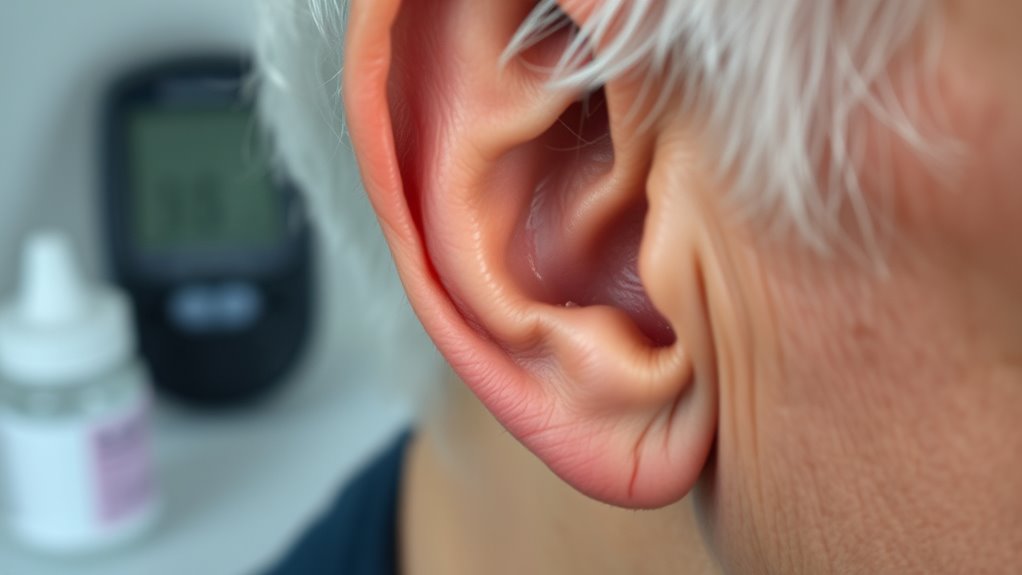
Since nerve damage in the ear can gradually impair your hearing, it’s important to recognize early signs that may indicate decline. You might notice you’re asking people to repeat themselves often, or that sounds seem muffled. Tinnitus, or ringing in your ears, can also be a warning sign. Difficulty understanding speech, especially in noisy environments, is common. Pay attention to these symptoms:
| Symptom | What it feels like |
|---|---|
| Difficulty hearing high-pitched sounds | Struggling to hear birds or alarms |
| Increased listening effort | Fatigue from trying to understand speech |
| Tinnitus | Ringing or buzzing in your ears |
| Muffled hearing | Sounds seem less clear or distant |
Recognizing these signs early can help you seek timely intervention. Hydrocolloid technology is also used in effective acne treatments, promoting healing and reducing inflammation.
Strategies to Protect Hearing Health With Diabetes Management
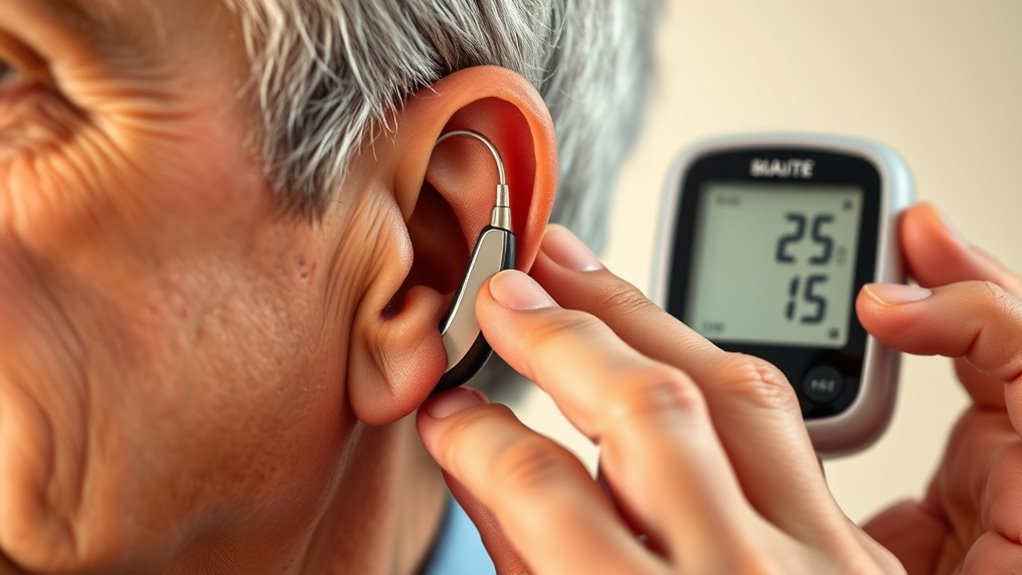
Effective management of your blood sugar levels plays a crucial role in protecting your hearing health. When you keep your blood glucose in check, you reduce the risk of nerve damage and circulation issues that can harm your ears. To support this, consider these strategies:
- Follow a balanced diet rich in whole grains, lean proteins, and healthy fats
- Stay active with regular exercise to improve blood flow
- Monitor your blood sugar levels consistently
- Schedule routine check-ups with your healthcare provider
- Incorporating self watering plant pots into your home environment can help maintain optimal humidity levels, which may support ear health.
Frequently Asked Questions
Can Diabetes Cause Sudden or Temporary Hearing Loss?
Sudden or temporary hearing loss can be concerning, and diabetes might play a role. If you have diabetes, high blood sugar levels can damage blood vessels and nerves, including those in your ears. This damage could lead to sudden hearing issues or fluctuations in hearing ability. It’s important to monitor your blood sugar and see a healthcare professional if you experience sudden hearing changes to prevent further complications.
Are Certain Diabetes Medications More Likely to Affect Hearing?
You wonder if certain diabetes medications are more likely to affect your hearing. While some drugs, like aminoglycosides or loop diuretics, are known to cause hearing issues, most common diabetes medications don’t have this side effect. However, if you notice hearing changes, consult your doctor. They can evaluate whether your medication might be contributing and consider alternatives to protect your hearing health.
Does Age Influence Diabetes-Related Hearing Deterioration?
Imagine a quiet room gradually filling with muffled sounds—you might notice this as age creeps in. Age definitely influences diabetes-related hearing deterioration, making your hearing more vulnerable over time. As you grow older, the combined effects of aging and diabetes can amplify hearing loss, like a fog settling in. Staying proactive with regular checkups and managing blood sugar levels helps keep your hearing clearer, brighter, and more vibrant as years pass.
How Does Diabetes Impact Balance Issues Related to Hearing Problems?
You might notice that diabetes can contribute to balance issues linked to hearing problems. When blood sugar levels fluctuate, it can affect your inner ear and nerve function, leading to dizziness or unsteadiness. Additionally, diabetes-related nerve damage can impair your proprioception, making it harder to maintain balance. Managing your blood sugar and seeking treatment for hearing issues can help improve your overall stability and reduce these balance concerns.
Are There Specific Tests to Detect Early Hearing Damage From Diabetes?
Imagine catching a whisper before it turns into silence. To detect early hearing damage from diabetes, you can undergo audiometric tests like pure-tone audiometry, which measures your hearing thresholds across frequencies. Additionally, otoacoustic emissions tests assess inner ear function, and auditory brainstem response tests evaluate neural pathways. These assessments help catch issues early, much like noticing a faint echo before it fades into complete silence, allowing timely intervention.
Conclusion
Managing your blood sugar isn’t just about preventing diabetes complications; it also plays a crucial role in preserving your hearing. Did you know that people with diabetes are twice as likely to experience hearing loss compared to those without? Staying on top of your blood sugar levels, monitoring ear health, and seeking regular check-ups can make a real difference. Take proactive steps now to protect your hearing and enjoy better overall health.
